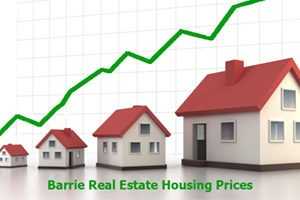Barrie Real Estate Market is mainly driven by prices in Toronto
Barrie Real Estate Market Prices Continue to Climb
Current Barrie MLS stats indicate an average house price of $472,447 and 331 new listings in the last 28 days. As of today, Barrie housing data shows median days on market for a home is 33 days.  Although Barrie’s prices have not returned to the highs of early 2018, they have steadily increased after 2018’s price correction. Toronto investors still look at Barrie as a “Good Deal” compared to buying investment properties in Toronto.
Although Barrie’s prices have not returned to the highs of early 2018, they have steadily increased after 2018’s price correction. Toronto investors still look at Barrie as a “Good Deal” compared to buying investment properties in Toronto.
How to Gauge the Market?
If you’re house-hunting, the number of new homes on the market is a good indication of much inventory you’ll have to choose from. If you’re selling a home, the number of homes sold is a good indicator of how the market performed and whether the average sale price is up or down over the same time last year. Call any of our Local Experts and find out whats happening in Barrie today.
Although the Toronto Real Estate market which has slumped since the introduction of the Fair Housing Policy in April of 2017 there are signs that the prices are starting to rise. Sotheby’s reported that in the GTA there were 25 per cent more $1 million-plus homes sold in the first half of this year than in 2017, though condos in that category decreased by 8 per cent in the same period. Sotherby is predicting an increase in prices in the 5 % region.
In this frenzied market, a shrewd speculator barely has to work to see a return. Scott Ingram, a Toronto real estate agent, took note when a house in his neighbourhood sold recently for $1.04 million—a $102,000 increase from the last time it was sold, which was only nine months prior. Zero renovations had been done in the meantime.
The hyper competitive market is exhausting for those hunting for a home, but even some real estate agents are feeling the strain. “It’s not fun to operate this way,” Ingram says. “If clients are constantly priced out and losing bidding wars, it’s easy to get discouraged. I share in some of that grief.”
The rental market, meanwhile, isn’t any more forgiving. The rising cost of home ownership is pushing more people to rent, and the vacancy rate in Toronto has tightened over the past few years to 1.3 per cent, according to CMHC. Some landlords are exploiting the situation with some rentals doubling in cost. As usual when the government steps in help any market, it is usually the people who can least afford it who pay the price. First time home buyers are bearing the brunt of this governments intervention and will now have to settle for buying housing at the lower end of the market.
Many experts think Canada is following the same path as the US when their “Housing Bubble” collapsed. But then these same “Experts” have been saying the same thing since 2007. Here on the inside, it’s easy to become complacent and assume the current trends are normal, if not sustainable. But step back, and Canada’s monster housing market becomes all too apparent. One way to do that is to compare it to the United States. On a few key metrics, Canada has far surpassed the U.S. at its peak. “This bubble is on par with what the United States looked like back in ’05, ’06, ’07. We have to actually take a look at the situation. The housing market here is in a classic price bubble.
Last March, Canada’s unstoppable bull market in housing entered its eighth consecutive year since recovering from a brief downturn amid the global financial crisis. Even that contraction looks like a mere blip when viewed against the long-term trend. The country’s real estate market has been on a tear for nearly two decades, enriching homeowners, burdening new home-buyers with debt.
In a June report titled Are Ontario Home Prices in a Corrective or Price Bust Phase?, the Canada Mortgage and Housing Corporation predicted a mild price growth for GTA real estate into 2019, but also warned that speculators might need to temper dreams of a return to the wild markets of 18 months ago. “The current home price correction in Ontario will likely not persist as it fails to resemble the more serious downturns observed across time,” the report stated. But it also said: “for homeowners and investors, it means home price expectations will need to normalize.”
